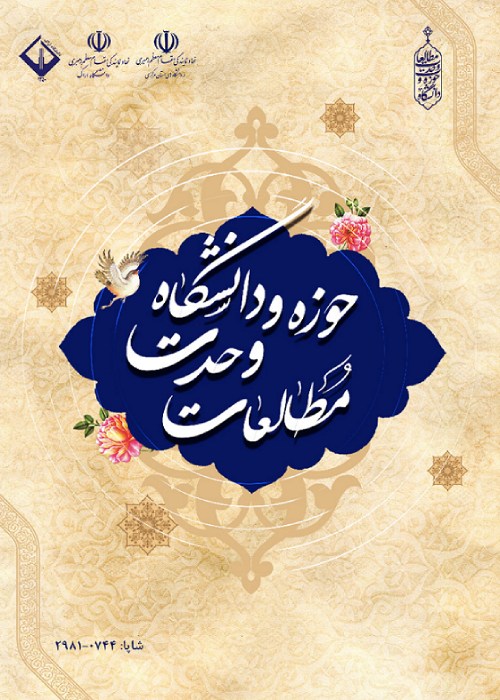Looking at justice from the perspective of Ali in Nahj al-Balagheh compared to contemporary cultural politics of the country
Author(s):
Article Type:
Research/Original Article (بدون رتبه معتبر)
Abstract:
justice,
cultural politics,
Nahj al-Balagha,
cultural identity,
cultural life,
cultural security.
The topic of justice has been one of the most important topics and concerns of human beings and social and political thinkers since long ago, and various opinions and ideas have been expressed and written about it. Hazrat Ali has been prominent in human history as a thinker whose name is always associated with justice. This study aims to do a comparative investigation of justice from these two perspectives with the method of document study and content analysis of contemporary cultural policy models and patterns and analysis of Amir al-Mu'minin's biography in Nahj al-Balagheh regarding the issue of justice. The findings show that fair access is the first principle for justice that is emphasized in all national and international theories, ideas, and documents. This equality includes all stages of cultural production and creativity, cultural distribution and consumption, which will ultimately lead to the development of cultural life. According to Imam Ali, the criterion for policy-making and the main and ultimate goal of governance is the establishment and expansion of justice. He considers government as a way to establish justice and serve the society. According to the imam, justice is the principle that can maintain the balance of society and ensure everyone's satisfaction. The imam considered all goodness to be in the shade of justice and fairness and introduced it as the noblest principle in bringing the individual and society to perfection. Because it is in the light of justice that everything is placed in its right channel and the rights of everyone who has rights are paid, and the foundation of perfection is prepared for everyone, and the governments become stable and the society progresses. The findings indicate that cultural development in contemporary cultural policymaking is achieved through the three major cultural policies, namely identity, life and cultural security, and the view of justice can be traced more than the path of prosperity and development of cultural life in cultural policymaking. Also, the view of justice in the policy system remains at the level of ideals and is poorly implemented in the operationalization stage. While justice has a wider scope from Mola Ali's point of view and is an important principle affecting all three areas of cultural development, which includes identity, life and cultural security.
cultural politics,
Nahj al-Balagha,
cultural identity,
cultural life,
cultural security.
The topic of justice has been one of the most important topics and concerns of human beings and social and political thinkers since long ago, and various opinions and ideas have been expressed and written about it. Hazrat Ali has been prominent in human history as a thinker whose name is always associated with justice. This study aims to do a comparative investigation of justice from these two perspectives with the method of document study and content analysis of contemporary cultural policy models and patterns and analysis of Amir al-Mu'minin's biography in Nahj al-Balagheh regarding the issue of justice. The findings show that fair access is the first principle for justice that is emphasized in all national and international theories, ideas, and documents. This equality includes all stages of cultural production and creativity, cultural distribution and consumption, which will ultimately lead to the development of cultural life. According to Imam Ali, the criterion for policy-making and the main and ultimate goal of governance is the establishment and expansion of justice. He considers government as a way to establish justice and serve the society. According to the imam, justice is the principle that can maintain the balance of society and ensure everyone's satisfaction. The imam considered all goodness to be in the shade of justice and fairness and introduced it as the noblest principle in bringing the individual and society to perfection. Because it is in the light of justice that everything is placed in its right channel and the rights of everyone who has rights are paid, and the foundation of perfection is prepared for everyone, and the governments become stable and the society progresses. The findings indicate that cultural development in contemporary cultural policymaking is achieved through the three major cultural policies, namely identity, life and cultural security, and the view of justice can be traced more than the path of prosperity and development of cultural life in cultural policymaking. Also, the view of justice in the policy system remains at the level of ideals and is poorly implemented in the operationalization stage. While justice has a wider scope from Mola Ali's point of view and is an important principle affecting all three areas of cultural development, which includes identity, life and cultural security.
Keywords:
Language:
Persian
Published:
Journal of Studies on the Unity of the Havzah and the University, Volume:1 Issue: 1, 2024
Pages:
90 to 102
magiran.com/p2673564
دانلود و مطالعه متن این مقاله با یکی از روشهای زیر امکان پذیر است:
اشتراک شخصی
با عضویت و پرداخت آنلاین حق اشتراک یکساله به مبلغ 1,390,000ريال میتوانید 70 عنوان مطلب دانلود کنید!
اشتراک سازمانی
به کتابخانه دانشگاه یا محل کار خود پیشنهاد کنید تا اشتراک سازمانی این پایگاه را برای دسترسی نامحدود همه کاربران به متن مطالب تهیه نمایند!
توجه!
- حق عضویت دریافتی صرف حمایت از نشریات عضو و نگهداری، تکمیل و توسعه مگیران میشود.
- پرداخت حق اشتراک و دانلود مقالات اجازه بازنشر آن در سایر رسانههای چاپی و دیجیتال را به کاربر نمیدهد.
In order to view content subscription is required
Personal subscription
Subscribe magiran.com for 70 € euros via PayPal and download 70 articles during a year.
Organization subscription
Please contact us to subscribe your university or library for unlimited access!



